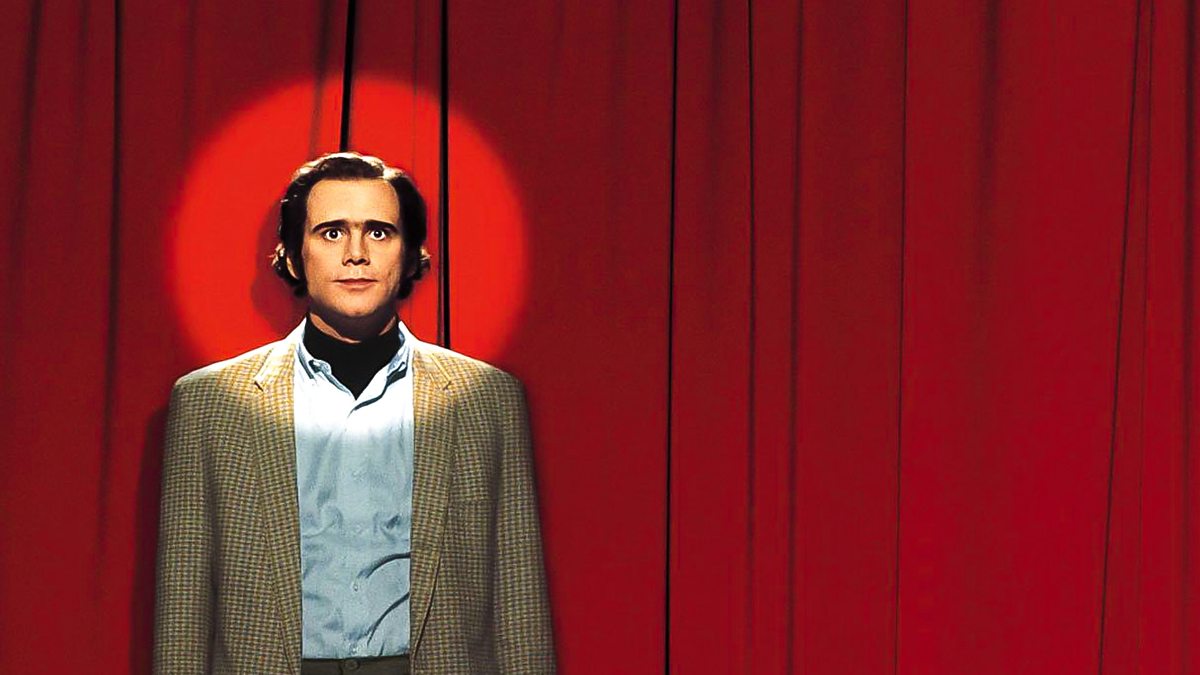Andy Kaufman doesn’t want you to watch his biopic. At the start of “Man on the Moon,” Kaufman (played by Jim Carrey) appears on screen, addressing us directly, using the squiggly voice he’d wield on stage and on “Taxi.” “I would like to thank you for coming to my movie,” he says before admitting, “I wish it was better, you know, but it is so stupid. It’s terrible. I do not even like it! All of the most important things in my life are changed around and mixed up for ‘dramatic purposes.’”
That opening was funny in 1999, but in 2024, it might be even better. Biopics have rarely been a creatively fertile genre—so many are made, so few are good—but in the last 25 years, they’ve seemed especially arid. It’s telling that, as commercially successful and acclaimed as “Oppenheimer” was, nobody thinks of it as a J. Robert Oppenheimer biopic. The movie’s too good to be considered “just” that—and Christopher Nolan himself has talked about conceiving the film as a heist movie, a thriller, anything other than a biopic. They show up a lot during awards season, but rarely are they taken seriously, no matter how many Oscars they win.
The reasons why biopics remain so popular—and so often are underwhelming—are embedded in “Man on the Moon,” which screens at Ebertfest on Saturday, complete with a Q&A with screenwriters Scott Alexander and Larry Karaszewski. But you shouldn’t listen to Kaufman: His movie is as wonderful as ever. And it still serves as a guide to how to make a great biopic.
But much like Kaufman, who died of lung cancer in 1984 at the age of 35, “Man on the Moon” relishes upending conventions. Although not as radical or willfully combative as Kaufman in his prime, the movie (which received zero Oscar nominations and bombed at the box office) nonetheless exudes a similarly whimsical, questioning spirit, telling a biopic narrative without the annoying biopic trappings. Yes, we see Kaufman’s greatest hits—his “Mighty Mouse” performance on “Saturday Night Live,” his long-running bit with wrestler Jerry Lawler, his Elvis impression—but Forman resists offering the usual simplistic insights.
As opposed to other artist biopics—“Ray,” “Bob Marley: One Love”—which seek to uncover the a-ha moments of inspiration that gave birth to indelible songs, “Man on the Moon” lets the germ of creativity remain unknowable. Why did Kaufman stage such an unusual TV special that included Howdy Doody? Because he liked the character as a kid, no big deal. Why did his 1979 Carnegie Hall show feature Santa Claus? Because he wanted to make something joyful. The film simultaneously demystifies and amplifies the ineffable spark that produces enduring art. You can watch “Man on the Moon” dozens of times and still never fully “understand” how Kaufman did what he did. Other biopics pretend to illuminate—“Man on the Moon” respects and preserves the mystery of what went on inside Kaufman’s head.
That mystery is accentuated by Carrey, whose performance could also initially be viewed as biopic-y. If you’ve watched the endlessly compelling 2017 documentary Jim & Andy: The Great Beyond, you saw the ridiculous lengths he went to stay in character at all times. (The behind-the-scenes footage makes it clear his costars and director wanted to slug “Andy.”) But while biopics are often praised for how much the actor “disappears” into the role, and although Carrey embodies the comic’s demeanor, mannerisms, and different voices—including that of obnoxious alter ego Tony Clifton—the performance is not an act of mimicry.
Instead, you feel Carrey connecting to Kaufman, appreciating his flair for confrontation and his passion for challenging his audience. But, like the film itself, Carrey isn’t trying to explain Kaufman. As deeply as Carrey dove into Kaufman—and Clifton—on set, he leaves something fascinatingly unknowable about the man. “Man on the Man” suggests that no one fully “got” Kaufman—not his manager George Shapiro (Danny DeVito), not his girlfriend Lynne Margulies (Courtney Love), and not his best friend and creative partner Bob Zmuda (Paul Giamatti)—and the film’s arms-length approach is echoed in Carrey’s strategically distant performance. You walk away from “Man on the Moon” loving Kaufman’s bits but getting no closer to the artist. That’s how Andy wanted it, and that’s what Carrey honored.
As Kaufman warns at the start of “Man on the Moon,” are there important things in his life that are changed around for dramatic purposes? Oh, sure: Some biopic conventions can’t be entirely avoided. But few entries in the genre are as lovingly ambivalent as “Man on the Moon.” Most biopics want to convince you that their subject is the greatest, most amazing, most inspiring, most wonderful, most important individual the world has ever known. (They’re basically a feature-length campaign ad.) But while Forman and his collaborators have nothing but admiration for Kaufman, “Man on the Moon” eschews hagiography because of its satisfyingly unresolved quality.
Indeed, while his life and death are on display, there’s a refreshing neutrality to the presentation. Some scenes, you may find Kaufman to be a brave comedic anarchist setting fire to the banality of network sitcoms. Other times, you may think he’s just a jerk indulging his odd sense of humor in order to torture his fans. Your mileage will vary as an audience member, and 25 years later, I think that’s what makes this such a standout biopic. “Man on the Moon” loves Kaufman, but even it can’t entirely make up its mind about him. That’s not a weakness but, rather, a strength, leaving room for viewers to filter his life through our perspective.
Plus, the world itself has changed since this film’s initial release. In the late 1990s, selling out was still an artistic sin, with Kaufman held up as one of the champions of Never Compromising. But despite our modern entertainment landscape full of anti-comedy and niche performers, that attitude has mostly faded away—artists have learned to embrace their corporate masters. Is Kaufman a symbol of an honorable, forgotten mindset? Or was he just a pain in the ass, selfishly amusing himself? I lean toward the former while acknowledging the times that he veered toward the latter. “Man on the Moon” spotlights both sides—no judgments and no conclusions.
The further away we move from his death, the more enigmatic Andy Kaufman becomes. And the better his movie plays. Too many biopics want to assure us that they have all the answers—that an amazing life can be summed up in a few hours, leaving us with all the correct positive emotions as we exit the theater. “Man on the Moon” is suspicious of such niceties. So much of Kaufman’s prankish work was about misdirection, false appearances, elaborate schemes—why shouldn’t his film be equally self-aware about the limits of a “true” portrait of an artist? This movie won’t tell you what made Andy Kaufman tick, but it understands what he meant. Forget phony insights and fake uplift: Ultimately, that’s all I need from a biopic.












